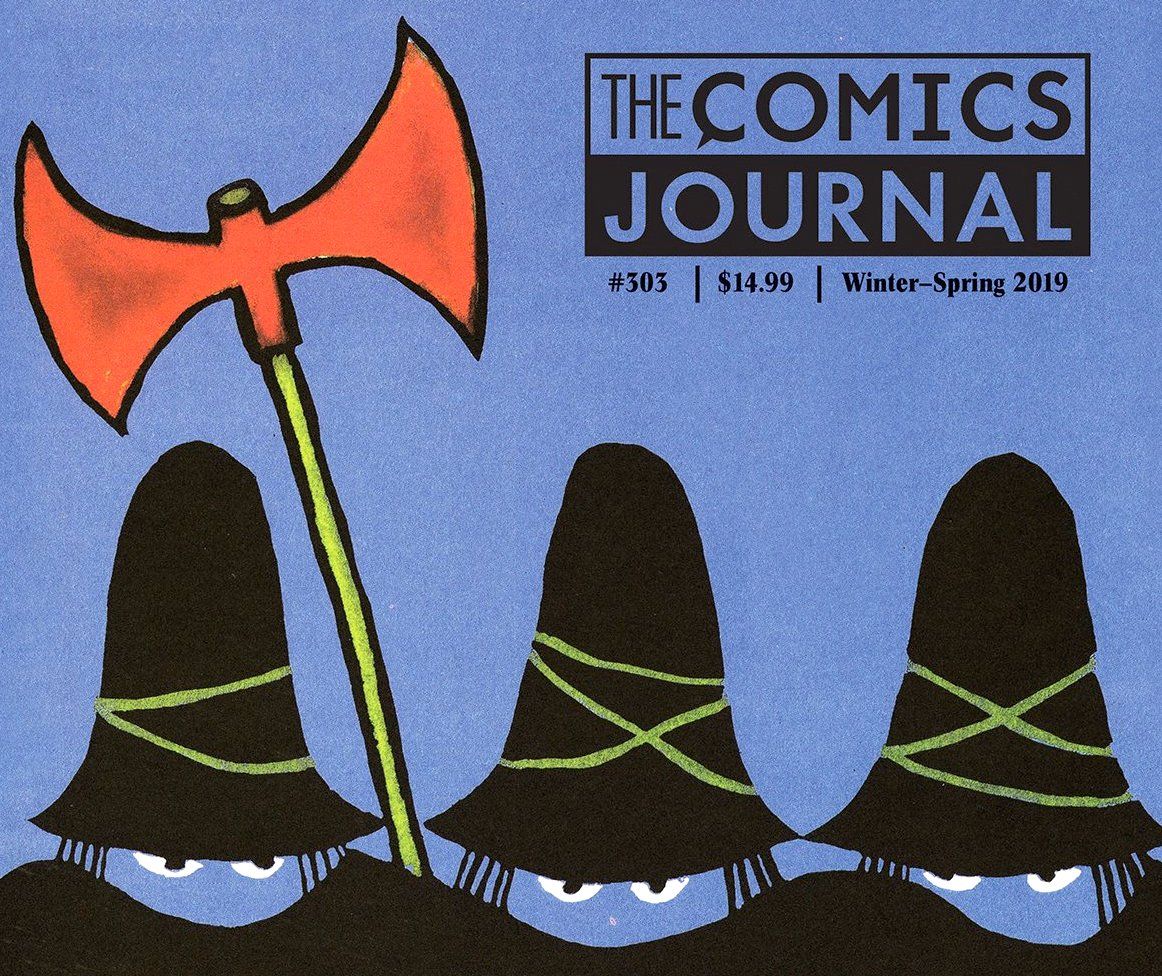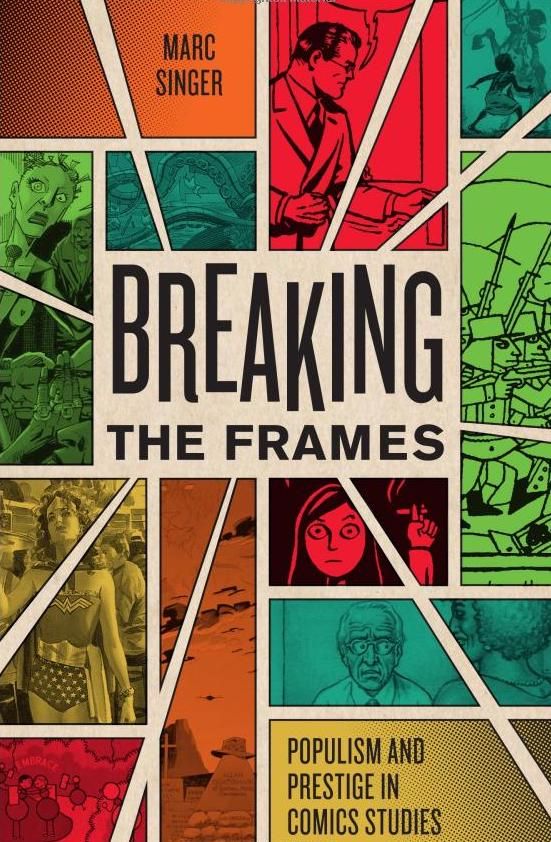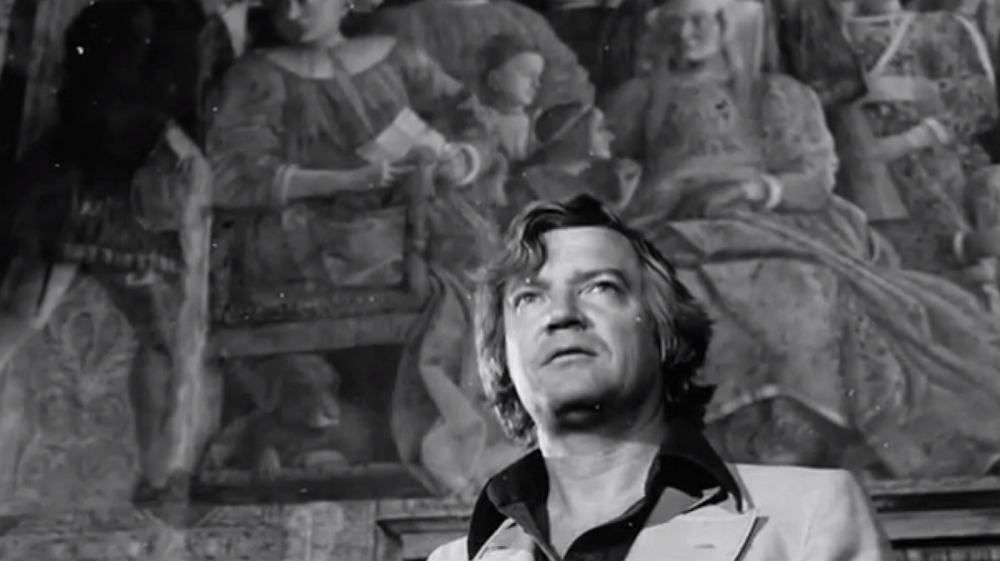
The Comics Journal resurrected its print version in January, if not quite Back By Popular Demand then maybe a recognition that TCJ had a presence while it was around that no one else has wanted to emulate during its absence. The history of TCJ is what happens when a pop-culture criticism self-starts in a field with no academic scholarship around to corral the undomesticated animal and it proceeds to maul the grandparents, and that book has already been written; which leaves the question of what it intends to do here and now, when pop-culture scholarship is everywhere. An editorial says TCJ will focus on letting artists speak, and “be motivated by giving the comic creator [this] missing platform.” Whether the problems of the business have really been made worse by a lack of platforms for creators to speak might be debatable—a lack of collective action perhaps, but that’s not the same thing, and the Disney Industrial Complex rolls on. But I’m working on the principle that there should be more venues for arts criticism on paper, rather than fewer.

And then, among the fishes, a whale.
Marc Singer’s book Breaking the Frames also calls for more criticism, by very politely surveying the field of comics scholarship and taking the current crop of practitioners to the cleaners. In the process, parallels with other departments of arts criticism and discourse in general are laid out on display. Singer calmly presents the opposing position to some choice bits of common dogma, noting that much current pop-culture scholarship hardly amounts to criticism by the actual standards of that word at all; and that critics might consider holding a conversation not carving a position statement; and that using art to confirm the hidden wickedness of the people who make it leads to anti-art behaviour; and that critics who only talk about art in terms of art should perhaps not be critiquing art in the first place; and another half-dozen positions from the list of those currently in retreat but which absolutely should not be. The only thing he skirts around is the basic question of art’s political effect in the first place, as per Robert Hughes, walking this path decades ago. Singer’s book is important, not least for the network of people currently tutoring early-career film critics, who should read it and take a prompt sabbatical.
Some items on the slab:
The approach taken by academics who identify as fans: that good criticism has to be aspirational…Many of the authors of these pieces remain woefully and sometimes wilfully ill informed about the art, industry, and criticism of comics, as they often have not bothered to familiarise themselves with their subjects…Certain strands of cultural studies limit their focus to a narrow and self-affirming set of theoretical positions, while they neglect economic and historical contexts that can’t be explained through textural interpretation alone.
A radically undisciplined discipline left only with an unquestioning affirmation of the popular, and an equally vapid condemnation of a nebulously defined elite.
Considering pop-culture artefacts as if they were manufactured in isolation of the economic and historical factors that surround them is part of the current limbo, where every opinion is isolated from every other and freed from the terrible burden of consequences. Where, say, film critics embrace the low barriers to entry into criticism and the resulting open-ended workforce, but are silent about the basic economic consequence of downward pressure on wages all the way to zero and no career ladder worthy of the label.
We are all MFAs now. Writing programs have often been criticised for producing formulaic paint by numbers fiction and promoting an assembly belt aesthetic. Investment in established notions of literary value contributes a new set of challenges.
Why are film and comics criticism treated as traditional conservative humanities disciplines in the first place, and taught as if they must remain so? Singer makes a case for why rigorous academic language might be necessary, but the uses found for that language are the standard comfort blankets of literature studies and the hunt for The Exceptional Work, sieving aspirational self-expression and personal epiphanies from the silt. And that’s in the scholarship aisle; in the consumer-facing world, the adoption of humanities language beyond its natural borders has nearly killed the art of rhetoric stone dead.
Individualism is perfectly amenable with the foundations of neoliberal policy. Any political movement focused on individual freedoms is potentially more compatible with neoliberalism than with social justice. Any mode of autobiography or life-writing is potentially consonant with the political quietism and social atomisation of neoliberalism.
It’s perfectly clear why, say, Captain Marvel should cause unease inside critics trying to fit the authentically conservative Chosen One narratives of most superhero origins into the supposedly leftist pop-culture activism that they’re hoping to see, in films delivered by the Disney Industrial Complex. But the discussion of what critics should do in response never begins, since it would need to recognise the lack of authentic leftist stories and why they are absent, alongside detecting how identity politics might actually suppress stories of collective action and crises of principle, rather than encourage them.
The demystifying debunking sensibility that approaches every text as a set of problematic assumptions waiting to be revealed. Scepticism as dogma.
Unlike some of Singer’s other topics, there are plenty of people pushing back against this, which hardly makes it less important. Of all the bad habits in arts criticism that need to cease, the one whereby critics proscribe art based on its surface level alone and look no deeper is the one that needs to be reframed first, on its way into the dustbin. At the very least, no one walking out of a Lars von Trier film at a trade show has any business claiming to do so as a liberal progressive.
+++
Singer’s book led to another one, Neon Visions by Brannon Costello, which takes a serious look at Howard Chaykin comics. This means starting from the position that Howard Chaykin comics might be worthy of a serious look, rather than from the one that says he’s a hysterical reactionary and then tracks back through the evidence trail like a crime spree, and also means looking at some of the things Chaykin has actually said about his own art. Chaykin has a particular engagement with sex and death which makes much less of a split between those two things than most, and if it’s a personal philosophy then it’s addressed through irony and metaphor, which might on its own be a reason for a sober assessment rather than an indictment or a surface-level excuse. (Neon Visions doesn’t get as far as The Divided States of Hysteria, although Chaykin made his own comments about that controversy at length in the letters pages of the series itself.) But mostly the book calls for critics, rather than necessarily every casual passing reader, to apply the same working standards as scholarship in other fields—for the young field of comics criticism to walk the walk since the talk about a once marginal art form has now become very easy. It isn’t calling for the author’s position on Chaykin to be definitive, but it is calling for criticism to be capable of constructing more than one position in the first place.
“The critic is not the one who debunks but the one who assembles.”
Bruno Latour, 2004.
“We cannot afford to be quite so cavalier about the differences between finding things out and making them up.”
Rita Felski, 2015.
 Our founder
Our founder